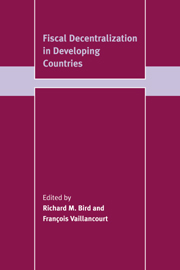Book contents
- Frontmatter
- Contents
- List of tables
- List of contributors
- Preface
- 1 Fiscal decentralization in developing countries: an overview
- 2 China: evaluating the impact of intergovernmental fiscal reform
- 3 India: intergovernmental fiscal relations in a planned economy
- 4 Indonesia and Pakistan: fiscal decentralization – an elusive goal?
- 5 Morocco and Tunisia: financing local governments – the impact on infrastructure finance
- 6 Colombia: the central role of the central government in fiscal decentralization
- 7 Argentina: fiscal federalism and decentralization
- 8 South Africa: an intergovernmental fiscal system in transition
- 9 Bosnia-Herzegovina: fiscal federalism – the Dayton challenge
- Index
7 - Argentina: fiscal federalism and decentralization
Published online by Cambridge University Press: 09 October 2009
- Frontmatter
- Contents
- List of tables
- List of contributors
- Preface
- 1 Fiscal decentralization in developing countries: an overview
- 2 China: evaluating the impact of intergovernmental fiscal reform
- 3 India: intergovernmental fiscal relations in a planned economy
- 4 Indonesia and Pakistan: fiscal decentralization – an elusive goal?
- 5 Morocco and Tunisia: financing local governments – the impact on infrastructure finance
- 6 Colombia: the central role of the central government in fiscal decentralization
- 7 Argentina: fiscal federalism and decentralization
- 8 South Africa: an intergovernmental fiscal system in transition
- 9 Bosnia-Herzegovina: fiscal federalism – the Dayton challenge
- Index
Summary
From a fiscal viewpoint, Argentina must still be regarded as a formal federation, rather than a truly federal country, in so far as the experience of the last sixty years shows that the provinces shifted the responsibility for the main taxes (income, sales, excise and fuel taxes) into the central government's hands, despite their constitutionally ample independent taxing and spending powers. The resulting revenue concentration (at the national level) was matched by a spending decentralization process whereby the responsibility for key areas, such as education, health, and housing, was transferred to the provinces.
In relation to the above-mentioned features, this chapter, after some brief theoretical considerations, examines the analytic aspects of decentralization in Argentina. Both macro and micro issues of intergovernmental fiscal relations are reviewed and scrutinized. The chapter also sheds light on the likely evolution of federal fiscal arrangements; in particular, whether the situation will evolve in the direction of delegation (strengthening of the principal–agent relationship) or, on the contrary, toward devolution, in which mechanisms of collective decision-making closer to the public choice approach can be expected to prevail.
An outline is also given of the key elements of the institutional setting in Argentina, as well as a description of changes over time of assignments of expenditures and taxes between the central and the subnational governments. The relevant quantitative aspects of Argentine federal finances and intergovernmental fiscal arrangements are shown with statistical data for the period 1983–95.
- Type
- Chapter
- Information
- Fiscal Decentralization in Developing Countries , pp. 206 - 238Publisher: Cambridge University PressPrint publication year: 1999
- 4
- Cited by



